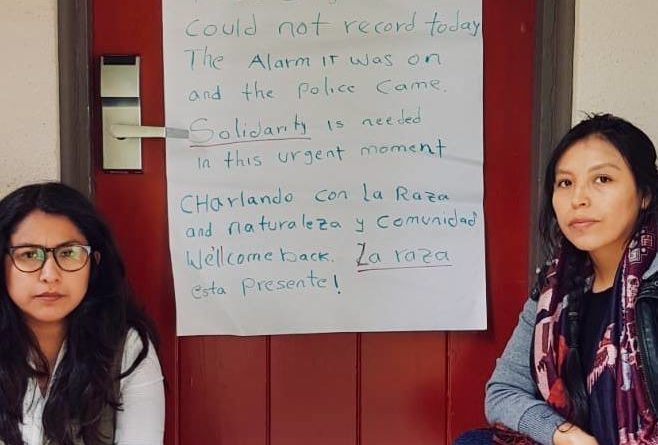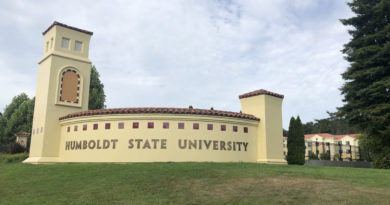KHSU firings affect local Spanish programming
Community and student Radio Bilingüe shows are suspended, no timeline for return
It’s a pity that this happens because of the university. The administration is there for that, so that it finds other ways and so that it can solve problems, not to make more problems.”
Yojana Miraya
Community members who tune in and listen to local Spanish radio shows will find something is missing. No more “Charlando Con La Raza,” “Immigrant Voices” nor “Naturaleza y Comunidad de La Pachamama.”
On April 11, the administration at Humboldt State University (HSU) caught the community, staff and volunteers at KHSU radio station off-guard – after deciding to cut all positions, including student and volunteer positions.
Along with those positions, community and student-run programming were suspended. Local programming that aired under Radio Bilingüe was also silenced. The shows that were part of Radio Bilingüe’s programming and offered local Spanish content through KHSU are off the airwaves indefinitely.
One of the main reasons for dismissing KHSU radio staff and cutting programs was to “prevent further negative impact to the University’s budget,” according to a press release by HSU on April 11.
For now, there’s no timeline for when or if these student-run shows will be returning, according to Communication Specialist for Marketing and Communications Grant Scott-Goforth.
What’s next for local programming?
HSU Vice President of University Advancement, Craig Wruck, informed the hosts of Charlando Con La Raza, Xochitl Cabrera, Brenda Mendoza and Yojana Miraya, via email on April 13, that student volunteers could continue with their shows, and that they would soon be notified of the procedure to follow.
“Staff will reach out to you next week to arrange a time to record upcoming programs. You are still listed on the KHSU website as hosts and your programs are still there,” Wruck wrote in the email.
While waiting for some indications that did not arrive, they decided to give in the microphone as a sign of solidarity toward their producer, Jessica Eden, as well as the rest of the staff that was fired.
“I do not intend to continue with the program until all the team that was fired is reinstated, not only the producer,” Mendoza said.
The hosts of Charlando Con La Raza said they are still committed to the community and plan to continue their activism. They will look for other possible spaces, perhaps even a podcast, where they could still stay in contact with the community while supporting former KHSU staff.
“That’s how life is. Sometimes you lose, sometimes you win and this is not a lose. It’s just an experience and we’re going to be fighting,” Miraya said.
As of now, KHSU is only broadcasting various syndicated programing from Radio Bilingüe.
Reactions
Charlando Con La Raza began in October 2017. While Naturaleza y Comunidad de La Pachamama had its beginnings in the first weeks of 2018 with Miraya as its host.
They feel a profound indignity and outrage upon the atrocities that have happened, both in the suspension of the local Spanish programming and in the way in which they dismissed the workers and volunteers of KHSU.
“It’s a pity that this happens because of the university,” Miraya said. “The administration is there for that, so that it finds other ways and so that it can solve problems, not to make more problems.”
Eden was also a content director for Radio Bilingue at KHSU and was one of many KHSU staff members that was fired. She had been involved with the radio since the early 90’s when she was still an undergraduate student.
“I think we’re all just hugging each other a lot because a lot of people feel like it was a bit of a death,” Eden said. “But for this community, it’s a little bit of a loss for sure.”
History & Local Spanish programs
Charlando Con La Raza was broadcasted Tuesdays at 7 p.m., Wednesdays at 7 a.m. and Saturdays at 1 p.m. Naturaleza y Comunidad de La Pachamama was aired one hour after this show.
In the show Naturaleza y Comunidad de La Pachamama, Miraya focused mainly on the participation of HSU students majoring in environmental studies. This program gave them the opportunity to share and talk about their research, projects and theses with the purpose of educating the community. They would also touch on matters of social justice and indigenous communities on the North Coast.
Mendoza described the broadcast of Charlando Con La Raza as “international windows,” since they had guests from other countries such as Argentina, Bolivia and Peru. This provided the community to learn about different cultures.
Another show by communication lecturer James Floss called Immigrant Voices that would narrate the stories of undocumented people in Humboldt County coming from other places such as Mexico, Peru, Colombia and El Salvador.
Immigrant Voices would work close with HSU’s Spanish Translation club, which translated the Spanish stories into English. Later, actors and interpreters would voice the English stories in the show. The original stories were told through Voces Inmigrantes, the Spanish version of the show.
According to Floss, administration also took down content, such as archives down from the KHSU website from his show.
“I was able to get the story out in two ways: in the original language and in English. I thought it was important work. It was a year’s worth of work on my part,” Floss said. “It’s all gone. It’s inaccessible now.”
Editor’s Note: Multiple attempts were made to reach out to HSU’s administrators at various times for comment via email and phone including President Lisa Rossbacher, Vice President of University Advancement Craig C. Wruck with no response in return.




